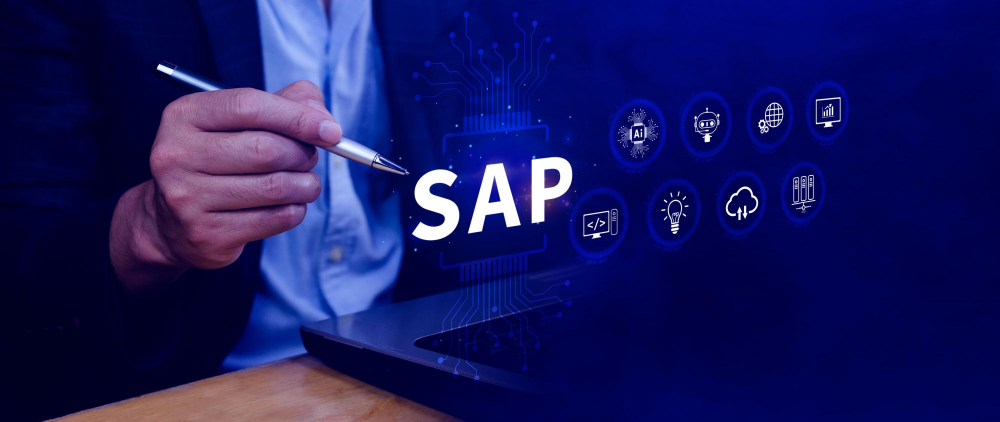- Blog
- October 13, 2025
The future of SAP: Integrating automation and analytics on Microsoft azure

- Blog
- October 13, 2025
The future of SAP: Integrating automation and analytics on Microsoft azure
Organizations across the globe are at a critical juncture in their digital transformation journey. As the 2027 SAP ECC (ERP Central Component) support deadline approaches, enterprises are discovering that migrating to SAP S/4HANA on Microsoft Azure offers far more than compliance, it also unlocks unprecedented opportunities for automation and intelligent analytics.
With over 30,000 SAP ECC customers requiring migration and 48% choosing RISE with SAP on Azure, this platform combination has emerged as the preferred path for enterprise modernization.
Transforming business operations through strategic integration
The integration of SAP systems with Microsoft Azure represents a fundamental shift in how enterprises approach business intelligence and process automation. Organizations today are just no longer moving applications to the cloud, instead, they are reimagining their operational models to leverage advanced analytics and AI-driven insights.
Some of the leading enterprises like Nestlé, Hilti, and Accenture have already tested and demonstrated that this integration works and delivers measurable business value. Eventually, these organizations have transformed their decision-making processes, reduced manual workloads, and gained competitive advantages through real-time business intelligence.
The strategic value extends beyond individual applications. Azure’s integration capabilities enable organizations to create unified ecosystems where SAP data seamlessly flows to Microsoft Power BI, Office 365, and advanced analytics platforms, eliminating traditional information silos.
Advancing automation through cloud-native capabilities
Modern automation extends far beyond simple task scheduling. Organizations implementing SAP on Azure are deploying sophisticated automation frameworks that are integrating business processes across multiple systems and departments.
The integration between Azure DevOps and SAP Cloud Application Lifecycle Management exemplifies this advancement. Enterprises utilizing this integration have reported significant improvements in software delivery cycles, with automated testing, deployment, and monitoring reducing manual errors and accelerating time-to-market.
Process automation now encompasses supply chain optimization, financial reporting, compliance monitoring, and customer service workflows. These automated systems operate continuously, providing 24/7 business process execution while maintaining audit trails and regulatory compliance.
Leveraging AI-powered analytics for strategic decision making
The convergence of SAP’s Joule AI assistant with Microsoft 365 Copilot has provided a significant opportunity to enterprises in terms of analytics accessibility. This integration enables users to query business data using natural language, democratizing access to insights across organizational levels.
Business users can now generate complex analyses without requiring specialized technical knowledge. Azure Machine Learning services enhance these capabilities by enabling predictive analytics on SAP data. Organizations implement demand forecasting, risk assessment, and operational optimization models that learn from historical patterns and adapt to changing business conditions.
The strategic partnership advantages
The Microsoft-SAP partnership, spanning over three decades, provides enterprises with unique advantages through joint engineering and co-innovation. Some of the recent developments include:
- Enhanced platform integration: SAP Business Technology Platform availability on Azure Marketplace with 70 services across 10 Azure regions enables seamless hybrid deployments.
- Advanced analytics capabilities: SAP Databricks integration with Azure’s native services provides zero-copy data sharing and enhanced performance for large-scale analytics workloads.
- Enterprise security: Comprehensive identity management through Azure Entra ID ensures secure access control across integrated systems.
- Service level assurance: Exclusive 99.95% SLA for SAP Cloud ERP Private on Azure provides enterprise-grade reliability with coordinated support.
Ensuring security and compliance
Enterprise adoption of cloud-based SAP solutions requires robust security frameworks. Azure’s comprehensive security architecture addresses these requirements through multiple layers of protection, including advanced threat detection, encryption, and access controls.
The platform’s extensive compliance certifications cover industry-specific requirements such as SOC, HIPAA, and GDPR, enabling organizations to maintain regulatory compliance while benefiting from cloud capabilities.
The disaster recovery and business continuity features ensure operational resilience, with automated backup systems and multi-region deployment options protecting against various risk scenarios.
Future roadmap and strategic considerations
The evolution of SAP on Azure continues with several significant developments planned for 2025 and beyond:
- Expanded AI integration: SAP Joule will extend to additional applications including Ariba and Analytics Cloud, with enhanced multilingual support and generative AI capabilities for automated content creation.
- Multi-cloud analytics: Enhanced connectivity options will include integration with additional cloud platforms, enabling organizations to implement best-of-breed analytics strategies.
- Low-code automation: Development platforms will incorporate intuitive interfaces that enable business users to create automation workflows without extensive technical expertise.
Implementing the strategy and best practices
Organizations planning SAP-Azure integration should consider a structured approach to minimize business disruption and maximize value realization:
- Phased migration: Implementing workloads incrementally allows organizations to validate approaches and build internal capabilities progressively.
- Integration planning: Early integration with existing Microsoft 365 environments ensures seamless user experiences and maximizes productivity gains.
- Automation framework: Establishing CI/CD pipelines and automated testing as foundational elements rather than post-implementation additions.
- Capability development: Investing in team training on both SAP and Azure automation tools ensures organizations can fully leverage platform capabilities.
Strategic positioning for future success
The SAP-Azure integration opportunity represents more than a technology upgrade—it positions organizations for sustained competitive advantage through intelligent automation and data-driven decision making.
With approximately 57% of ECC customers still requiring S/4HANA migration by 2027, organizations that successfully implement comprehensive automation and analytics strategies will establish significant operational advantages over competitors.
Success requires viewing this integration as a business transformation initiative rather than an IT project. Organizations that embrace automation and analytics as core business capabilities, rather than supporting functions, will be best positioned to capitalize on emerging opportunities.
The convergence of SAP automation and analytics on Microsoft Azure provides the foundation for building adaptive, intelligent enterprises capable of thriving in an increasingly dynamic business environment. Organizations deploying this integration thoughtfully will establish the operational excellence and analytical capabilities necessary for long-term success.




